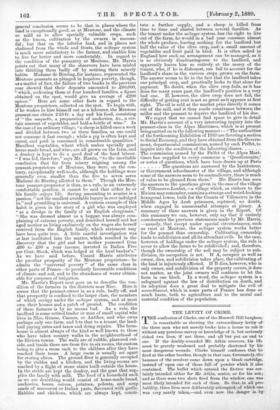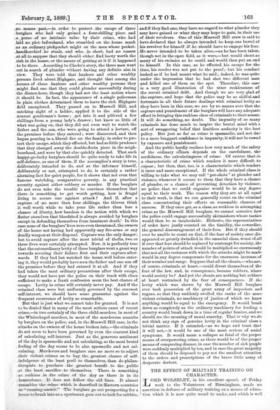THE LEVITY OF CRIME.
MHE confession of Clarke, one of the Muswell Hill burglars, is remarkable as showing the extraordinary levity of the three men who not merely broke into a house to rob it without any previous survey or knowledge of it, but seriously risked two lives, if not three, and all but put an end to one. If the doubly-wounded Mr. Atkin recovers, his life must, be gravely weakened and probably shortened by his most dangerous wounds. Clarke himself confesses that he fired at the other brother, though in that case, fortunately, the hammer of the revolver came down upon a blank cartridge, instead of upon one of those full of powder which it also contained. The bullet which entered the fir-tree was cer- tainly intended either for Mr. Atkin, senior, or for his son; and as there were two shots fired from the window, one was most likely intended for each of them. So that, in all pro- bability, three lives were deliberately attempted, of which one was very nearly taken,—and even now the danger is by no means past,—in order to protect the escape of three burglars who had only gained a four-shilling piece and a purse of no intrinsic value by their crime, who had laid no plot beforehand, who stumbled on the house much as an ordinary pickpocket might on the man whose pocket. ,handkerchief he steals, and .who, in short, had no reason at all to suppose that they should either find booty worth the risk in the house, or the means of ,getting at it if it happened to be there. According to Clarke's story, the three men went out in search of plunder without having any definite aim in view. They were told that bankers and other wealthy persons lived about Highgate, and thought that among the , houses of these bankers and other wealthy persons they might find one that they could plunder successfully during the dinner-hour, though they had not the least notion where it should be. In fact, the appearance of a single policeman in plain clothes determined them to leave the rich Highgate field unexplored. They passed on to Muswell Hill, and catching sight of a ladder, applied it to the side of the nearest gentleman's house ; got into it and pilfered a few shillings from a young lady's drawer; but knew so little of what was going on, that they. did not even wait to watch the • father and the-son, who were going to attend a lecture, off the premises before they entered ; were discovered, and then began pouring in a liberal fire on the family, in order to pro- tect their escape, which they effected, but had so little prudence that they changed away the double-florin piece in the neigh- bourhood, and were by that clue quickly detected. That such happy-go-lucky burglars should be quite ready to take life in self-defence, as one of them, if the accomplice's story is true, deliberately intended to do, and as the informer himself, deliberately or not, attempted to do, is certainly a rather alarming fact for quiet people, for it shows that not even that famous watchdog, comparative . poverty, is any practical security against either robbery or murder. If the burglars do not even take the trouble to convince themselves that there is something to get worth getting, how is frugal living to secure one against attack P And if, after a capture of no more than four shillings, the thieves think it well worth while to take your life rather than lose a chance of liberty, how baseless is the notion with which we flatter ourselves that bloodshed is always avoided by burglars except in defending themselves from imminent death! In this case none of the burglars' lives were even threatened, the owners of the house not having had apparently any fire-arms or any deadly weapon at their disposal. Capture was the only danger; but to avoid capture after the most trivial of thefts, two or three lives were certainly attempted. Now, it is perfectly true that the extraordinary levity of these burglars went a great way towards securing their failure first and their capture after- wards. If they had but watched the house well before enter- ing it, they would probably have seen the father and one son off the premises before they had entered it at all. And if they had taken the most ordinary precautions after their escape, they would not have put the police on their track with clues sufficient to make a frank confession seem the best chance of -escape. Levity in crime will certainly never pay. And if the -criminal class were but uniformly governed by the coarsest self-interest, we should have some guarantee against the frequent recurrence of levity so remarkable.
But that is just what we cannot take for granted. It is not to be denied that in many of the most serious cases of recent crime,—in two certainly of the three child-murders, in most of the Whitechapel murders, in most of the murderous assaults by burglars on the police, and, in the Muswell Hill case, in the attacks on the owners of the house broken into,—the criminals do not seem to have been governed by even the coarsest kind of calculating self-interest. Just as the generous sentiment of the day is spasmodic and not calculating, so the most brutal feeling of the day seems to be also spasmodic and not cal- culating. Murderers and burglars care no more so to adjust their violent crimes as to buy the greatest chance of self- indulgence at the least peril to themselves, than do philan- thropists to purchase the greatest benefit to the public at the least sacrifice to themselves. There is something as reckless in the crime of the day as there is in its benevolence. It does not follow the old lines. It almost resembles the crime which is described in Eastern countries as "running amuck." The burglars go out prospecting for a house to break into as a sportsman goes out to look for rabbits; and if they find one, they have no regard to what plunder they may have gained or what they may hope to gain, in their use of their revolvers. One of this Muswell Hill crew is said to have declared that he always intended to keep one barrel of his revolver for himself if he should have to engage his foes. He never intended- to be taken alive,—as he has been taken, though not in the open field, as it were,—but would shoot as many of his enemies as he .could and would then put an end
• to himself. In this case, as he effected his escape for the time, his resolve was not put to the proof; but his conduct looked as if he had meant what he said ; indeed, he was quite under the impression that he had shot two different man and killed one of them on the spot. Therefore, this case is a very good illustration of the utter recklessness of the recent criminal drift. And though we arc very glad. the the capture, and hope that the police may be as skilful and fortunate in all their future dealings with criminal levity as they have been in this case, we are by no means sure that the capture and punishment of the burglars will have any adequate effect in bringing this reckless class of criminals to their senses. It will do something, no doubt. The impunity of so many criminals has done much to inspire the brutal mind with a sort of swaggering belief that limitless audacity is the -best policy. But just so far as crime is spasmodic, and not due to a mere braggart confidence in impunity, it will not be cowed by exposure and punishment.
And the public hardly realises bow very much of the safety of the ordinary citizen depends on the carefulness, the sordidness, the cakulatingness of crime. Of course that-us a characteristic of crime which renders it more difficult -to expose ; but then, that, too, is a characteristic which renders it rarer and more exceptional. If the whole criminal class is willing to take what we may call " pot-shots " at plunder and violence, whenever it occurs to them that they have a chance of plunder, or a chance of preventing detection by violence, no police that we could organise would be in any degree equal to their work. The reason why they are at all equal to their work, is that we can generally count on the criminal class concentrating their efforts on reasonable chances of success. If they once get, as a class, as reckless in attempting crime as the Muswell Hill burglars, we cannot conceive how the police could engage successfully skirmishers whose tactics would then be so incalculable. Hitherto, the representatives of order have justly counted on the timidity, the cowardice, the general discouragement of their foes. But if they should ever be linable to count on that, if the fear of society once dis- appeared or greatly dwindled in the unsocial class, worst of all if ever that fear should be replaced by contempt for society, the number of points of attack would be multiplied so enormously that not all the rashness with which the attacks might be made would in any degree compensate for the enormous increase of their number and range. Suppose that all the cheats,—who are, of course, criminals at heart,—could divest themselves of the fear of the law, and, in consequence, became robbers, where would society be ? And yet the cheats are nothing but robbers at heart restrained by the fear of consequences. If the levity which was shown by the Muswell Rill burglars ever took possession of the great army of impostors and rogues, so that they suddenly swelled the ranks of the more violent criminals, no machinery of justice of which we know anything would be equal to the emergency. It would break down as completely as the ordinary machinery for feeding a country would break down in a time of regular famine, and we should see the meaning of moral anarchy. That is why we do not think any sign of genuine levity in the criminal class a trivial matter. If it extended,—as we hope and trust that it will not,—it would be one of the most serious of social symptoms. It would mean a collapse as fatal of the proper means of overpowering crime, as there would be of the proper means of conquering disease, in case the number of sick people were suddenly multiplied by ten, and in case the great majority of them should be disposed to pay not the smallest attention to the orders and prescriptions of the brave little army of desperate doctors.



































 Previous page
Previous page